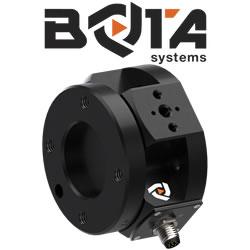Startup Brings Industrial-Sized Robots Into Your Home
Cardboard Robot Allows DIY's The Freedom To Program A Robotic Arm
August 13, 2012
Industrial-sized robots are one step closer to becoming a familiar sight in homes and classrooms thanks to the open-source Cardboard Robot.
Consumers will soon be able to pick up and move objects or take dramatic sweeping and swooping video shots with their smartphones with the aid of a giant (almost six foot span) computer controlled robot arm.
"You would have to spend at least $150,000 to acquire a real industrial robot," said Cardboard Robot Creator Ken Ihara. "With the Cardboard Robot, you can get many of the same thrills for 1/1000th the price."
The Cardboard Robot recently reached its funding goal on the popular crowd funding website Kickstarter. The first units are expected to ship in October or November 2012.
The Cardboard Robot has already made a splash in popular technology news, with coverage on PCWorld, Wired, Engadget, Electricpig, Ubergizmo, CNET and Element 14.
Things You Can Do With The CardBoard Robot
"I primarily view the Cardboard Robot as a device for keeping my kid away from the TV", Ihara said. "Instead of staring at a screen, kids can play with the physical world around them via this giant robot arm. In doing so they intuitively pick up on the mass and orientation of things, if you take it into a classroom, kids can learn the mathematics and physics of things in a fun and tangible way."
With the smartphone camera attachment, the Cardboard Robot becomes a low cost robotic camera crane. You can program set points, and then have the arm follow the predetermined path.
"If you have a model spaceship, you can use the Cardboard Robot to recreate the opening scene of the original Star Wars," Ihara said. "You can also use it to take time lapse photos with complicated motions that you could not achieve with what is currently on the market."
The Technology Behind the CardBoard Robot
The open-source electronics and software driving the Cardboard Robot is an attractive bonus for DIY hobbyists.
"If you do a search on ebay, all the 4-axis motor controllers are expensive units designed for large motors for CNC mills. Many of these units use older parallel ports." Ihara said.
The Cardboard Robot's electronics are ideally suited for smaller projects due to its size, low cost, USB port and open software. With the CardBoard Robot's motor controller and software, one can get a PC or Mac controlled project up and running in hours instead of weeks.
At the moment, Ihara is working on other projects that will use the CardBoard Robot board as a base.
"There are so many cool things that you can do with the electronics; the Cardboard Robot is just one example of many possibilities," said Ihara.
To learn more about the project or to pre-order the CardBoard Robot, visit http://bit.ly/CardboardRobotKS.
About Cardboard Robot
The Cardboard Robot was developed by Ken Ihara. Ihara is also the creator of the PianoMaestro, a USB electronic learning aid for the piano http://www.thepianomaestro.com. The Cardboard Robot was created to be an affordable and expandable technology to use as a springboard into the fascinating world of robotics and mechatronics.
Featured Product

Bota Systems - The SensONE 6-axis force torque sensor for robots
Our Bota Systems force torque sensors, like the SensONE, are designed for collaborative and industrial robots. It enables human machine interaction, provides force, vision and inertia data and offers "plug and work" foll all platforms. The compact design is dustproof and water-resistant. The ISO 9409-1-50-4-M6 mounting flange makes integrating the SensONE sensor with robots extremely easy.
No adapter is needed, only fasteners! The SensONE sensor is a one of its kind product and the best solution for force feedback applications and collaborative robots at its price. The SensONE is available in two communication options and includes software integration with TwinCAT, ROS, LabVIEW and MATLAB®.
